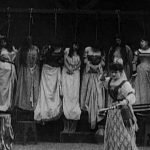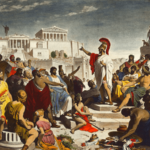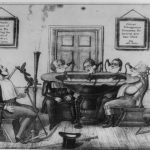When you’re a kid, the ‘What If” factor enters into your conscious during the questioning phase, cementing, during the age somewhere between 5 and 11, as the most annoying of your adolescence for people around you; when your whole life becomes the big “why?” it’s hard not to be exhausted with the endless possibilities for answering your questions. In fact, it very easily becomes impossible to end the conversation without bringing in another what if. In other words, it just never ends.
Recommended Reading
Boil, Bubble, Toil, and Trouble: The Salem Witch Trials
The Great Irish Potato Famine
The History of Christmas
Applying the what if factor to history and the minute details in events is exactly the same way; except instead of calling it what if, we call it counterfactualism. And like your 5 year old self, once the questions start, it’s hard to stop. It’s why among contemporaries, counterfactualism hardly has a place in intelligent discussion and reasoning. One historian dubbed the very idea a “mere parlor game” because historical fact, as it were, is hard to approach with counterfactualism when the very nature of historical methodology uses central evidence to make its claims. Yet counterfactualism continues on, in sly evidential claims and implicit ones as well, especially in contemporary literature created for the masses. But like all things, counterfactualism comes in a didactic form: good and bad, and things are bad because they have no reasoning, catering off into the imagination with no grounding, while good counterfactualism is good because it is well reasoned and has grounding.
While seemingly counterproductive to good history, the use of counterfactualism does engage the imagination—in fact this is many historians reasoning for keeping counterfactualism alive in scholarly study—but the real reasoning behind continuing its presence in argument and discussion is because counterfactuals appeal to laws, rationality, and casual analysis.
_________________
Simon Schama wrote: “If only the Austrian Archduke Franz Ferdinand’s driver had met a well-meaning man in the Sarajevo street in June 1914” and ends up asserting (tongue in cheek): “no First World War, no Hitler, no Stalin, no nuclear weapons, no Sarajevo crisis (1990s),” but instead of being published in a historical journal, it was published in Talk magazine, a decidedly less reputable source for honest fact. [2] And while Schama’s claims are certainly a big “what if,” they are not so different from Robert Fogel, who justly said, “[e]very historian who has set out to deal with the causes of the Civil War … has implicitly or explicitly presumed what would have happened to slavery if some events had unfolded in a way that was different from the actual course.” [3] So what’s the difference?
Fogel’s take on counterfactual claims is good because it is that thing we seek, grounded, in casual claims as well as being a big what if. In Fogel’s case, he proposes that when historians make these casual claims, the counterfactual claims piggyback for the ride. And while not every historian allow for causality, and not every philosopher will justify the addition of the counterfactualism, there is a some conclusion to be made without relying solely on causation:
A myth became established in later years that Napoleon missed the moment of French destiny when he failed to respond to the British approach of 21 February. In truth there was no British approach … Apart from this, the time had long passed … when England and France could by themselves impose their will on central Europe. Even with Russia, it would have been a speculative affair. [4]
We have seen what a problem the demobilization of the Swedish army in Germany and its withdrawal from the country had constituted at the conference table. But it is doubtful whether the restitutions and restorations stipulated by the Peace of Westphalia could have been realized, particularly in southern Germany, if the Swedish troops had not been in the country. [5]
A review of the results of the battle of Zorndorf leaves no doubt that Frederick would have acted more to his own advantage if on the fateful [day of] August 25 he had contented himself with carrying off the Russian heavy baggage, instead of aiming at the higher goal of crushing the hostile forces. [6]
Even if counterfactualism is and of itself a large part of discussion, whether it has any validity or not, it doesn’t mean that it should be the subject of any inquiries or further discussion. The fact of the matter is, while there can be a counterfactual claim in Thucydides or a counterfactual note present in Edward Gibbon in essays on counterfactual history, what is typically used is not the same as history, and not as old as the topic in question.[7] While it may be present in the very beginnings of discussion, the difference between counterfactualism existing and largely influencing the direction of study should be very different. But what happens when it brings up questions that really matter?
_________________
What may seem like a “mere parlor game” however is far from that when it is included, and circulated, among historical speculations, is a test of creativity among people of intellectual expertise.
John Keegan’s claims make a statement: “What if, in the summer of 1941, Hitler had chosen to make his major attack … into Syria and Lebanon?” Then (skipping the intervening conditionals), had he “used the Balkan victories of the spring of 1941 to align his forces for an Anatolian and Levantine victory, leading to wide conquests in Arabia and securing decisive positions on Russia’s southern flank, it is difficult to see how a variant of Barbarossa, conceived as a pincer movement rather than a blunt frontal assault, would not have succeeded.”
Because of Keegan’s thought process is backing in military fortitude, his counterfactualism arguments are not only imaginative but plausible. [10] But other than the fact that Keegan has some authorial pedigree, what about his claim is any more grounded? In “straight” history, and by extension, truth, history expounds on the straightforward claims. In general counterfactual claims would leave no evidence, no straightforward trails to grow any claims, and by being in nature untrue, counterfactual claims can be disregarded from a serious argument with no more attention served to them. But in the event of evidence, one could enter counterfactual arguments in with the “straight” history and “truth” wouldn’t have to enter into the discussion at all. [11]
Niall Ferguson has a theory: “how are we to distinguish between probable unrealized alternatives from improbable ones? … We should consider plausible or probable only those alternatives which we can show on the basis of contemporary evidence that contemporaries actually considered.” [12] But even if I didn’t fundamentally disagree with this theory (which I do, more on that later), it still only solves half of the counterfactual argument problem. If we take counterfactual arguments like science experiment hypothesis and use the “if…then” model, and knowing that the antecedent is untrue but take it as true, then you’re already factoring out the plausibility of the actual antecedent and only considering the plausibility of the consequences. Consider this: “If Al Gore had been declared the winner in Florida, then the United States would not have invaded Afghanistan.” In this instance, you’re having to consider both the plausibility in terms of the plausibility of the antecedent and the consequence, but Ferguson supposes with his assertion that one only needs to consider the plausibility of the consequence inside the antecedent. While a seemingly minor difference, in terms of evidence, it could be a huge decider in the outcome of an argument, and therein lies the difficulty.
In the grand scheme of things, very few people give Ferguson much attention since counterfactuals are in their very nature impractical. Instead, when counterfactuals are considered, we worry more about the plausibility of the consequence coming from the antecedent than just the plausibility of the antecedent.[13] For now, we can concern ourselves with a speculative antecedent and it’s equally suspect consequence and such things as these could all be plausible: “If Adolf Hitler had invaded England in 1940, he would have used tow planes to release gliders carrying parachute troops five miles east of Dover at an altitude of 3,000 feet,” [14] or: “If Jackson had not vetoed the re-charter of the Second Bank of the United States in 1832, the inflation crisis of the 1830’s would not have taken place,” [15] even though the plausibility of the antecedents in these statements is vastly different. Because according to Ferguson, even such outlandish claims as “If the partisans of Vilna had had a nuclear device at their disposal, they would have prevailed,” could be considered.
_________________
While all historians, including Ferguson, consider counterfactuals as something always of the imagination, we still consider the consequences of the counterfactual as though they were as steeped in evidence as the truth, because the discipline of a counterfactual can always be determined by the structure of the imagination, the deep understanding of small connections and obscurities, or that a good, and specialized, historian is always at the extent of a creative and disciplined mind. But even if we assume this to be try, counterfactuals may be no more than a boost in the imagination to aid any seeker on their road to discovery, only helping along in the construction of claims that lead to a discovery only cemented by evidence. Because ultimately, we can only base our discoveries on claims that have support.
Two historians, Phillip Tetlock and Aaron Belkin, seem to have offered six different types of counterfactual conditions that allow for them not to distract from apparent unbelievability. [17] They consider the other thing that makes counterfactuals even harder to take seriously: that every change after the initial counterfactual compounds on ideas of evidence rather than mountains of speculation. Where one chooses to draw the line of believability is completely predicted by relativity. In the example of Vilna, and supposing that the partisans of Vilna had nuclear weaponry at their disposal, they would have won, but there’s a rub to this conclusion; changing the past to make a counterfactual consequence make sense, very quickly takes the conclusion out of any idea of certainty. Because in this certain example, if Vilna had nuclear weapons, surely other would have been able to use the same weapons, and this completely changes the face of not only the Vilna situation, but the direction of the past for the entire world. Indeed, it makes the claim that only counterfactuals that employ the background conditions historians refer to a “co-tenability” can really be considered useful. But then again, what counterfactual takes precendent over the others?
Latest Society Articles
Who Invented Democracy? The True History Behind Democracy
Medieval Fashion: Tunics, Underclothes, Pointed Shoes, and More!
37 Underground Cities: The Hidden Pillars of Civilization
Demanding consistency across the board when it comes to counterfactualism is one of the methods of making a respectable argument while using them, but to philosophers, there’s also consideration of “projectability” for all assertions that counterfactual arguments also must adhere to, factoring in even more generalizations and relativity into the scheme.
_________________
Unlike scientists who follow direct laws of nature, historians have very little in following laws of the past. However, it doesn’t mean that historical lessons do not follow the laws of physics as humans and the past are tied to the constraints of physical beings. Whatever may be relativized by historians, it is undeniable that this is true: the Archduke Ferdinand was killed from a shot that was physically inflicted on his being. Because of the incredibly triviality of mentioning such a detail that goes completely for granted, we don’t even mention such a factor in our arguments. But in similar arguments, we do factor in the laws of physics because they seem more important than normal. For example, in the case of the first collapse of the Tacoma Narrows Bridge, as recorded by Albert Gunns (hereby I let go of any expertise of the subject and base all of my assertions on the facts given and researched and documented in the passage). [18]
The first Tacoma Narrows bridge collapsed on November 7, 1940, four months after construction was completed. The bridge was blown by winds of forty-two miles per hour. The collapse of the bridge was predicated by the bridge rippling and gyrating wildly. At 11 a.m., sections of the center span fell away, the cables slackened under the lowered weight of the bridge, and the main towers “snapped shoreward.” [19] While the short life of the bridge was no doubt partially caused by the weather conditions of the day, the construction of the suspension bridge had been suspect since its inception. “Even on relatively calm days motorists often experienced the unsettling sensation of seeing the car ahead momentarily disappear from view in a trough caused by the rippling of the deck.” [20] After it’s collapse, investigations into the make and model of the bridge noted two reasons for its failure: solidarity of the side structures of the bridge, and the narrowness of the bridge.
While planning for this bridge had begun in the 1920’s, it wasn’t until the 1930’s that financial plans were cemented for the project. The original project was expected to be less than 4 million to building, with no government subsidies helping the project move forward, but when it was finally approved toward the end of 1938, the project was costing almost 7 million, with the government absorbing 50 percent of the total cost. To keep the costs from rising even further, additions and changes were made to the plans that had the company also responsible for the George Washington Bridge and the Golden Gate Bridge move from a four lane bridge to a two lane bridge. Due to the weight and scope of the new project, the bridge was more susceptible to weather conditions and turbulence, unlike it’s more expensive, sturdier counterparts. As Gunn puts it: “had the roadbed been more than two lanes wide, as was the case with other long suspension bridges, normal design practice would have resulted in a deck that was heavier and more rigid and therefore less susceptible to aerodynamic effects.” [21]
What the counterfactuals due in this case that are seemingly different from other cases is based in the law of physics within this condition; while the plausibility of the counterfactual is controlled by changing history, it is also controlled by the plausibility of mechanics, which gain their plausibility from facts. In this sense, the counterfactualism has no direct evidence, but it is plausible indirectly due to the counterfactuals dependence on the laws of mechanics and no act of imagination factors into this debate. The connection between plausible and implausible for this history counterfactual actually is not dependent on the imagination; it’s dependent on the laws of nature.
Laws, even those that are not even remotely tied to the laws of history, that get used in defence of history may be scarce on the ground, but if we lean on these laws in the areas of population, epidemiology, and economic history, we can ground counterfactuals in reality. Arguments that, when applied to natural laws, can decide whether rural migration in the 16th century would have had any effect on the population growth of the cities, or whether, if containment procedures had been put in place in 17th century Europe, the epidemic proportions of the Plague could have been superseded. [22, 23] And, more effective of our current position, whether if railroads hadn’t been invented would the growth of the American nation would have been directed more toward the South than to the West. [24]
READ MORE: Who Invented the Railroad? Exploring the Fascinating History of Railroads
But even with hard facts working to give backbone to our claims, when our ideas of facts ends, can anything give out counterfactual claims solidarity other than imagination?
_________________
In a different part of the world not many years later but worlds away from the Tacoma Bridge in Avaraches, on August 1944 the U.S. army established a beachhead. General Bradley’s forces were at the west of Germany’s forces, directed by Field Marshal Kluge. According to popular opinion, Kluge was left with the choice of retreating east, or confronting the Americans and cutting of their supply while also gaining a sea coast from the west [25]. While Bradley’s First Army was holding off the Germans while the Third Army made to make toward the south and west, Bradley felt his forces were at liberty to hold off until the Germans made their own decision despite having four companies at his disposal (either could move south and west, or buffer the company attacking the Germans).
While Kluge retreated east, despite Hitler ordering him to attack the American forces in the West, Kluge didn’t get out fast enough.[26] With the order from high command telling him to push the forces to the sea, Kluge got trapped between the additional companies and Bradley’s choice to aid the First Army with additional support ended up being the smart move. [27] However, Bradley’s decision was made without the knowledge of Hitler’s referendum to Kluge, and without knowledge that Hitler’s plan was to push the American forces to the sea, and if Bradley hadn’t made his exact decision when he did, the American forces would have been too far from the First Army to give them any aid.
In this counterfactual claim, there is no science factual argument; it is based on the war ideology that the acting agents aim to win. The element that comes into play here is our understanding that rationality will win the day as well; we can make inferences about how one would act if we were in a similar situation. When wartime isn’t involved however, our ability to properly assess this situation off of the battlefield is completely determined by our understanding of the wants and desires of the actors involved. In the event that we misinterprete their will or beliefs, we can make claims that are completely irrelevant to the time.
_________________
The structure of Genoise governments during the late medieval period was organized using clan organizational form that provided rules and regulations for the rest of the community to act. And being that as it were, clan leaders were able to dictate economic and social changes that benefitted their agendas when it was suited to them. According to Avner Grief, this was common, as was the opposite (as in clans pitting themselves against one another when they didn’t like any of the process). [29] This meant self-interest was almost always at work within the Genoa communities that benefited the select few in power, and largely dictated the nature of economic progress as possession was a complex quid quo pro in correlation with the naval and military sanctions with overseas entities.
During the period between 1099-1162, there was not only internal community peace, but also external cooperation, with the clans struggling within themselves for power rather than effecting the greater majority. For people of a different background, how can one understand the relative peace in the absence of a larger governing system? “[W]hat were the factors fostering or diminishing each clan’s motivation to maintain political order in advancing Genoa’s economy rather than using military force against the other clans to gain political supremacy over the city?” [30]. This self-governing mechanism covered all sorts of smaller things, such as instances of conflict, but these weren’t apparent to an outside account, and therefore begs the question: did the system behave, and if so, how did it behave?
Grief’s assessment of the period is predicated on the understanding that clan cooperation was apparent, and there was little acquirement in way of possession, despite Genoa having control of the seas and naval prowess at the time. [31] And when the clans had little return from spoils, this meant that there was little disruption by way of clan governance. [32]. If this be the case, then the self enforcing system is as follows: possessions are arranged from most beneficial to leave, and the point at which it makes no economic sense to commit to acquiring new possessions is reached at an earlier point in time than it would have been reached if a without a more substantial governing system in place. The idea that the marginal cost must be less than the benefit of the new acquisitions also predicts something else: A raid may be the result of an acquisition of spoils directly or may be the result of an acquisition of a possession that will yield ongoing benefits.
_________________
If the above argument is in fact correct, there are more than laws that we can use to employ to validate counterfactuals, and it also gives us an idea of how to extend our rationals. The mere assertion of a law carries all sorts of counterfactual implications. In casual assertions, we can make the claim on a set of counterfactual implications, and if we can do this in our laws, why not here, in our historical deconstructions? This not only allows us to continue compounding on counterfactuals without going on thin factual ice, but it becomes a reliable function of on which we can base our claims. For this, it’s easier to just say what we mean; that we often make casual judgements based on historical evidence and community standard and we can put those tools to use in different situations that may go outside of the historically relevant field.
There are two other features of counterfactualism that we must consider: one being how things would remain the same is the antecedent was changed, not just different, and how the agents involved would have viewed the change of the antecedent. This involves not only the probability of the historian’s interest, but the specific factors within the argument affecting not just a different antecedent, but all the other things going differently as well.
Explore More Society Articles
Dangerous Liaisons: How 18th Century France Made The Modern Media Circus
The Ultimate History (and Future) of Shaving
History of Mother’s Day: The Origin Story Behind Mother’s Day
The History of Asbestos
Ancient Greek Food: Bread, Seafood, Fruits, and More!
The History of Guns in American Culture
I have made the case that counterfactualism has made, and continues to make, considerations on history and the modern world on a day to day basis, and indeed it’s reasoning plays a definite role in the historical makeup of the world. And as long as it continues to be grounded in as much fact, whether it be rational law or natural law, it can still be considered, as it will always be a conversation points for those curious and creative enough to imagine themselves in a time not their own.
_________________
Notes
See below throughout, as well as Robert Cowley, ed., What If? 2: Eminent Historians Imagine What Might Have Been; Essays (New York, 2001).
Simon Schama, “And What If …,” Talk (December 1999): 152.
Robert William Fogel, Without Consent or Contract: The Rise and Fall of American Slavery (New York, 1989), 413.
A. J. P. Taylor, The Struggle for Mastery in Europe, 1848–1918 (London, 1971), 149.
Hajo Holborn, A History of Modern Germany, 1840–1945 (1959–69; rpt. edn., New York, 1971), 14.
Lord Acton, The Cambridge Modern History, vol. 6 (Cambridge, 1969), 287–88.
As in, for example, Niall Ferguson, “Introduction: Virtual History: Toward a ‘Chaotic’ Theory of the Past,” in Ferguson, ed., Virtual History: Alternatives and Counterfactuals (London, 1998), 8; and Bruce Bueno de Mesquita, “Insights from Game Theory,” in Philip E. Tetlock and Aaron Belkin, eds., Counterfactual Thought Experiments in World Politics: Logical, Methodological, and Psychological Perspectives (Princeton, N.J., 1996), 211–29, see 213–14.
John Keegan, “How Hitler Could Have Won the War: The Drive for the Middle East, 1941,” in Robert Cowley, ed., What If? The World’s Foremost Military Historians Imagine What Might Have Been; Essays (New York, 1999), 297.
Keegan, “How Hitler Could Have Won the War,” 305.
Robert Cowley, “Introduction,” in Cowley, What If? xiii.
Although, in the currently favored semantics for possible worlds, counterfactuals are true or false in the following sense: to say A counterfactually implies B in our world is to say that the closest possible non-A worlds are non-B worlds.
Ferguson, “Introduction,” 86 (italics omitted).
Note to philosophers: our interest here is epistemic, not semantic, qua these counterfactual claims.
Derived from Kenneth Macksey, Invasion: The German Invasion of England, July 1940 (London, 1980), 120.
See Peter Temin, The Jacksonian Economy (New York, 1969). He argues the contrary view. I am grateful to Mike Merrill for this reference.
This reflects the way in which counterfactual claims in history based on imagination might well be thought of as a subset of thought experiments. In “The Logic of Thought Experiments,” Synthese 106 (1996): 227–40, I argued that (at least many) thought experiments are unreliable. But I argued that this notion of unreliability has to be understood relative to the goal of thought experiments as knowledge-producing. However, thought experiments play a varied role, and knowledge production is a goal only under quite limited circumstances.
17 Philip Tetlock and Aaron Belkin, “Counterfactual Thought Experiments in World Politics: Logical, Methodological, and Psychological Perspectives,” in Tetlock and Belkin, Counterfactual Thought Experiments, 16–31. Here I have collapsed some of Tetlock and Belkin’s six criteria. Moreover, I have treated their condition of theoretical or statistical consistency as a virtue only to the extent that they are “projectable.” One condition of theirs I have not included is that the antecedent of good counterfactuals should require changing as few historical facts as possible. I’ll take this up in the discussion of the virtues of antecedents later.
18 Albert Gunns, “The First Tacoma Narrows Bridge,” Pacific Northwest Quarterly 72 (1981): 162–69. See also Structural Research Laboratory University of Washington, “Aerodynamic Stability of Suspension Bridges with Special Reference to the Tacoma Narrows Bridge,” University of Washington, Engineering Experiment Station Bulletin, no. 116, pt. 1 (Seattle, 1949).
19 Gunns, “First Tacoma Narrows Bridge,” 163–64.
20 Gunns, “First Tacoma Narrows Bridge,” 163.
21 Gunns, “First Tacoma Narrows Bridge,” 165 (italics mine).
22 E. A. Wrigley, Population and History (New York, 1969).
23 Geoffrey Hawthorn, Plausible Worlds: Possibility and Understanding in History and the Social Sciences (Cambridge, 1991).
24 Robert William Fogel, Railroads and American Economic Growth: Essays in Econometric History (Baltimore, 1964).
25 O. G. Haywood, Jr., “Military Decision and Game Theory,” Journal of the Operations Research Society of America 2 (1954): 365–85.
26 At least by the lights of a “maximin” strategy in which each party chooses the best of the worst positions available. Following Haywood (“Military Decision,” 375–77), assume Bradley orders his preferences as: gap holds, possibly Germans encircled (1), strong pressure on German withdrawal (2), moderate pressure on German withdrawal (3), weak pressure on German withdrawal (4), gap hold (5), gap cut (6); while for Kluge the preference ordering is reversed.
As Haywood points out, Bradley’s maximin (*) does not coincide with Kluge’s (**)—which creates a differential advantage to a player willing to assume a less conservative strategy that depends on “betting” on the other players’ intentions. This forms the formal basis for the counterfactual discussed in the text that follows.
27 Haywood, “Military Decision,” 375.
28 Haywood, “Military Decision,” 377 (italics mine).
29 Avner Greif, “Self-Enforcing Political Systems and Economic Growth: Late Medieval Genoa,” in Robert Bates, Avner Greif, Margaret Levi, Jean-Laurent Rosenthal, and Barry Weingast, eds., Analytic Narratives (Princeton, N.J., 1998), 23–63.
30 Greif, “Self-Enforcing Political Systems,” 29.
31 Greif, “Self-Enforcing Political Systems,” 37.
32 Greif, “Self-Enforcing Political Systems,” 37.












It should also be known that counterfactual history is the history not just of what *would have happened* in this universe, but also what *has happened* in another universe.
This is according to the multiverse theory from astrophysics, in which it is argued by certain scientists that for every single given event with two or more outcomes, our universe has one outcome but another universe has a different outcome. According to this theory, the Big Bang was too powerful to have just created our own exponentially expanding universe. Instead, it spurred a whole bunch of other universes, and we all coexist independently, separated by distances far greater than the 92 billion-light-year width of our own universe. In each such universe, there are the exact same copies of us, cars, trees, etc., just that history unfolds there differently from here in this universe.
Thus, counterfactual history isn’t necessarily just a thought experiment, and the closely-related alternate history isn’t necessarily confined to science fiction or similar literature/film/TV/theatre/poetry. Rather, especially if the multiverse theory proves to be correct, counterfactual history *is* real-life history. Not in this universe, but in another universe. It could absolutely happen, for instance, that in another universe, Napoleon did in fact win the battle of Waterloo in 1815, or the Nazis did in fact win World War II (quite a scary scenario for us in the Allied countries, of course), or JFK did in fact not get assassinated in 1963.